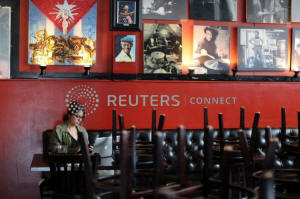For U.S. small restaurants, coronavirus impact is swift and brutal
 Send a link to a friend
Send a link to a friend
 [March 19, 2020]
By Lindsay Dunsmuir and Ann Saphir [March 19, 2020]
By Lindsay Dunsmuir and Ann Saphir
WASHINGTON/SAN FRANCISCO (Reuters) - On St.
Patrick's Day last year, Amy and Chris Hillyard marked the 30th
anniversary of Farley's, their pair of cafes in San Francisco and
Oakland, California, with live bagpipes and noisy crowds.
This year, they spent the day quietly packing up beans, granola, and a
vegan coconut curry made from unsold produce to give to the 40 employees
they had to lay off on March 16.
In the space of a month, the Hillyards had gone from their strongest
financial period, ever, to at least temporarily closing their doors.
"We were running at the top of our game as a business and it's just
devastating to have to turn off the engine," Amy said.
The rapidly escalating coronavirus outbreak in the United States has
begun to decimate the restaurant industry as an increasing number of
states and regions enforce population lockdowns and close eateries,
bars, gyms and other "non-essential" businesses.
The food service industry is the nation's second-largest private
employer, with 15.6 million employees, according to the National
Restaurant Association, which counts 1 million restaurants, including
fast food outlets, in the United States.

Of these, 90% are small businesses with fewer than 50 employees, NRA
says, a figure that includes franchised chain stores, which are usually
independently owned.
Restaurants are notoriously high-risk businesses, typically running on
pretax margins of 3 to 6%, which makes them extremely vulnerable in a
downturn.
The trade group estimates U.S. restaurants could take a sales hit of up
to $225 billion in the next three months, a quarter of the $899 billion
in sales that they had expected for the full year.
Approximately 6.7 million people in the San Francisco Bay Area, a
coronavirus hotspot, have been ordered since Tuesday to stay home until
April 7 except for essential outings. This type of lockdown is set to
become more widespread as cases of the virus rise elsewhere.
On the U.S. East Coast, New Jersey, New York and Connecticut struck a
regional agreement on Monday to close all movie theaters, casinos and
gyms. New York City may soon also issue a "shelter in place" order.
Restaurants and bars in the three states - where about 32 million people
live - will serve takeout and delivery only.
For the Hillyards, switching to takeout or delivery was not a viable
option, given the cafe is surrounded by now-empty office buildings. By
Monday, sales were down 70% from normal, as local businesses sent
workers home even before the lockdown started.
Their immediate concern is how to pay their bills. The next payment for
the staff's health insurance plan is due on March 25. Rent, their other
big monthly cost, is due on April 1 - but so is a loan payment to Bank
of America <BAC.N>, and they cannot make both.
OUT ON A LIMB
In Washington state, another virus hotspot, restaurants were also closed
to all but takeout and delivery earlier this week. Fon Spaulding, who
runs Kati Vegan Thai in Seattle, has seen sales fall almost 80% - the
same proportion of her customers that worked at the nearby headquarters
of Amazon.com Inc <AMZN.O>, until they were told to work from home.
[to top of second column]
|

Susan Upton, 53, works on her computer at her family restaurant
Mambos, which is being forced to close after 32 years, due to the
global outbreak of the coronavirus disease (COVID-19), in Glendale,
California, U.S., March 18, 2020. REUTERS/Lucy Nicholson

The city government has said it will spend $1.5 million on grants
for small businesses affected by the coronavirus, but that will not
help Spaulding.
"It is for people who don't have more than five employees. Our
restaurant couldn't get it," Spaulding said. She also remains
confused about what she qualifies for or how to get it. "We have
heard about many, many loans ... but we don't know exactly where to
start to apply."
DELIVERY IS NOT ENOUGH
Restaurant visits as measured by OpenTable were down 77%
year-on-year on March 16 in Washington, D.C., after the city told
restaurants and bars to stop serving customers on the premises, to
reduce the public's potential exposure to the virus.
There as elsewhere the hope is that the rise of online food ordering
over recent years will soften the blow.
Meals ordered digitally for delivery were up 16% in 2019 from the
year before, while digital orders for takeout increased 33%, data
analytics firm NPD Group said.
But delivery is a tiny slice of restaurant sales in normal times, at
roughly 3% of orders.
Ris Lacoste has owned Ris, a fine dining restaurant in the heart of
downtown Washington, D.C., for 10 years. Diners are used to feasting
on mussels as they sip their wine. Delivery and catering usually
make up 5% of sales at most.
She has been forced to let go of almost all her 50-odd staff. For
now it is just her, a front-of-house manager and a chef. On
Wednesday, they began serving a limited takeout menu, offering soup,
salad, pot pies and bread.
Lacoste said she cannot offer more choices without knowing how
popular they will be, because she cannot yet afford to buy more
product or rehire staff. The uncertainty of whether the restaurant
will be closed to in-house dining for two weeks or two months also
makes it difficult to plan.
"We are figuring out daily costs to keep the lights on," she said.
"Selling to-go is great and it might keep some places alive, but it
won't keep all of us alive."

The Hillyards are still hoping they will be able to reopen instead
of shuttering for good. Instead of loans, which have to be repaid
and will never cover the custom they have permanently lost, they
would like more direct help from local and federal government.
"We need a bailout," Amy said, sitting with Chris in the sunny
window of the empty cafe. "Why should banks and the cruise industry
get a bailout when we are the lifeblood, and the heartbeat, of the
community?"
(Reporting by Lindsay Dunsmuir in Washington and Ann Saphir in San
Francisco; Editing by Heather Timmons and Matthew Lewis)
[© 2020 Thomson Reuters. All rights
reserved.] Copyright 2020 Reuters. All rights reserved. This material may not be published,
broadcast, rewritten or redistributed.
Thompson Reuters is solely responsible for this content. |